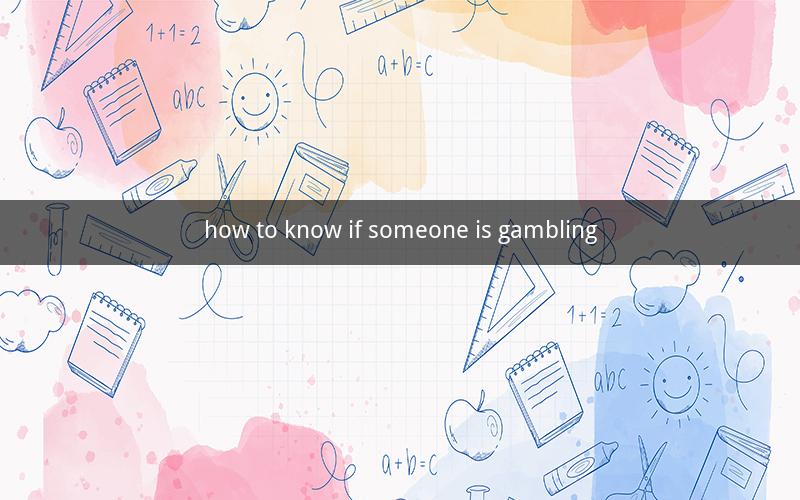
How to Know If Someone Is Gambling: Signs and Symptoms to Watch For
Table of Contents
1. Understanding Gambling Addiction
2. Common Signs of Gambling Addiction
3. Behavioral Indicators
4. Financial Woes
5. Emotional and Psychological Changes
6. Social and Family Impact
7. Professional Help and Support
8. Conclusion
1. Understanding Gambling Addiction
Gambling addiction, also known as compulsive gambling, is a serious condition that affects individuals of all ages, genders, and backgrounds. It is characterized by an inability to control gambling behavior, despite negative consequences. Recognizing the signs of gambling addiction is crucial for early intervention and support.
2. Common Signs of Gambling Addiction
2.1 Behavioral Indicators
- Increased Time Spent on Gambling: The individual may frequently mention gambling, spend more time than usual at casinos, online, or with friends who gamble.
- Secretive Behavior: They may hide their gambling activities, lie about how much time or money they spend on gambling, or avoid discussing it with others.
- Lack of Control: Despite attempts to stop or limit gambling, the individual often finds themselves unable to control their urge to gamble.
2.2 Financial Woes
- Debt Accumulation: They may accumulate significant debt due to gambling, often borrowing money from friends, family, or taking out loans.
- Financial Struggles: The individual may struggle to pay bills, cover living expenses, or provide for their family due to gambling-related financial issues.
- Selling Personal Belongings: To fund their gambling habits, they may sell personal items or possessions.
2.3 Emotional and Psychological Changes
- Anxiety and Depression: Gambling addiction can lead to increased anxiety, depression, and mood swings.
- Impaired Concentration: The individual may find it difficult to concentrate on work, school, or daily tasks.
- Sleep Disturbances: They may experience insomnia or other sleep-related issues due to stress and anxiety.
2.4 Social and Family Impact
- Relationship Strain: The individual's gambling addiction can strain relationships with family, friends, and partners.
- Social Isolation: They may withdraw from social activities and isolate themselves to avoid discussing their gambling habits.
- Legal Issues: Gambling addiction can lead to legal problems, such as theft, fraud, or embezzlement.
3. Professional Help and Support
3.1 Therapy and Counseling
- Individual Therapy: A therapist can help the individual understand the underlying causes of their gambling addiction and develop strategies to overcome it.
- Group Therapy: Joining a support group can provide the individual with a sense of community and understanding from others who have faced similar challenges.
3.2 Medication
- Antidepressants: In some cases, antidepressants may be prescribed to help manage symptoms of depression and anxiety associated with gambling addiction.
- Naltrexone: This medication can help reduce the urge to gamble by blocking the pleasure center in the brain.
3.3 Self-Help Strategies
- Setting Limits: The individual should set strict limits on how much time and money they spend on gambling.
- Support Systems: Building a strong support system of friends, family, and professionals can help them stay on track.
8. Conclusion
Recognizing the signs of gambling addiction is essential for early intervention and support. By understanding the behavioral, financial, emotional, and social impacts of gambling addiction, individuals can seek help and support to overcome this challenging condition.
Questions and Answers
1. Q: What are the most common signs of gambling addiction?
A: The most common signs include increased time spent on gambling, secretive behavior, financial struggles, emotional and psychological changes, and social and family impact.
2. Q: Can gambling addiction be treated?
A: Yes, gambling addiction can be treated through various methods, including therapy, counseling, medication, and self-help strategies.
3. Q: How can I help someone who is struggling with gambling addiction?
A: You can offer support, encourage them to seek professional help, and be patient and understanding throughout their recovery journey.
4. Q: Is there a difference between problem gambling and gambling addiction?
A: Yes, problem gambling is a mild form of gambling addiction, while gambling addiction is a more severe and chronic condition.
5. Q: Can gambling addiction affect a person's career?
A: Yes, gambling addiction can significantly impact a person's career, leading to job loss, decreased productivity, and financial instability.
6. Q: Are there any risk factors for developing gambling addiction?
A: Yes, risk factors include a family history of addiction, mental health issues, and exposure to gambling at an early age.
7. Q: Can medication alone cure gambling addiction?
A: No, medication can help manage symptoms but is not a standalone cure for gambling addiction. Therapy and counseling are also essential components of treatment.
8. Q: How can I tell if someone is lying about their gambling habits?
A: Look for inconsistencies in their stories, changes in behavior, and increased secrecy. Trust your instincts and be open to discussing your concerns with them.
9. Q: Can gambling addiction lead to legal problems?
A: Yes, gambling addiction can lead to legal problems, such as theft, fraud, or embezzlement, as individuals may resort to illegal means to fund their gambling habits.
10. Q: Is it possible for someone to recover from gambling addiction?
A: Yes, it is possible for individuals to recover from gambling addiction with the right support, treatment, and dedication to their recovery journey.